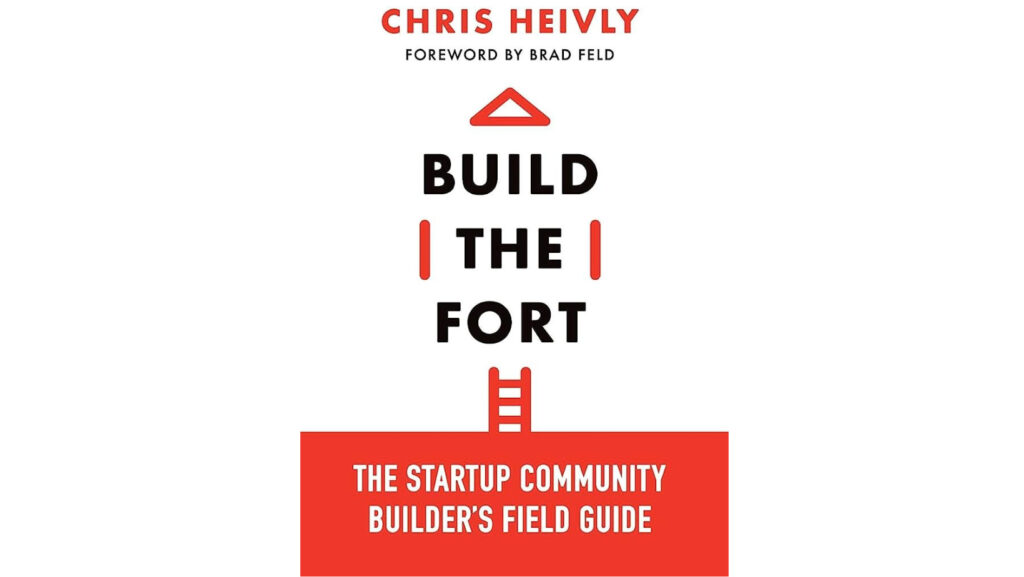“Build the Fort” by Chris Heivly: a practical field guide to building startup communities

As someone who is both a leader and life-long student of building startup and innovation ecosystems, I am always excited when new literature is released on this important topic. I vividly recall the Fall of 2012 when I was early in organizing Innovate Pasadena and Brad Feld released his ground-breaking book on “Startup Communities” which was immensely helpful as a framework. My library has since expanded to include Brad’s subsequent books but also The Rain Forest: The Secret to Building the next Silicon Valley, the Boulevard of Broken Dreams (both also published in 2012), the New Geography of Jobs, and more recently Jump-Starting America: How Breakthrough Science Can Revive Economic Growth and the American Dream to mention just a few. So I was particularly excited to see Chris Heivly’s newest Book on this topic: Build the Fort: The Startup Community Builder’s Field Guide.
Chris Heivly’s new book is a valuable resource for anyone interested in building a successful startup community. Drawing on his extensive experience as a startup founder and community builder, Heivly provides practical advice, tools, and frameworks to help aspiring community builders create thriving ecosystems.
At its core, “Build the Fort” is a guidebook for building a community of entrepreneurs, investors, and other stakeholders who can support and nurture startup success. Heivly draws on his experience co-founding MapQuest, one of the first successful online mapping companies, as well as his work building startup communities in North Carolina’s Research Triangle and other cities across the country primarily associated with his work at Techstars.
One of the key themes of the book is the importance of taking a “bottom-up” approach to community building. Rather than relying on government or other institutions to create a startup ecosystem top-down, Heivly argues that community builders need to focus on creating networks of entrepreneurs, investors, and other stakeholders who can support and mentor each other. He provides a number of practical tips for doing this, such as hosting regular events, creating online forums, and cultivating relationships with key influencers in the community. Many of these concepts nicely overlap with Brad Feld’s thinking and his Boulder Thesis.
One of the strengths of “Build the Fort” is its practicality. Heivly provides a number of concrete tools and frameworks that community builders can use to measure their progress and make data-driven decisions. For example, he introduces the concept “ecosystem maturity index” from nascent stage to leading stage, differentiating challenges and opportunities while ultimately providing high-level game plans for each stage.
While the book includes various anecdotes and stories from Heivly’s own experiences building startup communities and running his own accelerator (the Startup Factory), it is generally more prescriptive – indeed an effective “field guide” for the frontline practitioner. Furthermore the detailed descriptions of various specific tactics make his recommendations imminently actionable. These stories help to bring the concepts and frameworks to life, and make the book more engaging. Heivly’s writing style is clear and straightforward, making the book accessible to readers with a wide range of backgrounds and experience levels with ecosystem building.
One potential weakness of the book is that it is primarily focused on building startup communities in the United States. While many of the concepts and frameworks are likely to be applicable in other countries, readers outside the US may find that some of the specific examples and strategies to be less relevant. That being said, I believe this book is still likely to be a valuable resource for community builders around the world.
Overall, “Build the Fort” is an excellent resource for anyone interested in building a successful startup community. Whether you are an entrepreneur, investor, policymaker, or simply interested in the startup world, the book provides practical advice and insights that can help you create a thriving ecosystem. Heivly’s passion for community building is infectious, and his experience and expertise make him an ideal guide for anyone looking to make a difference in their local startup community. I most definitely highly recommend it and am excited to add it to my library of valuable resources on this important topic.